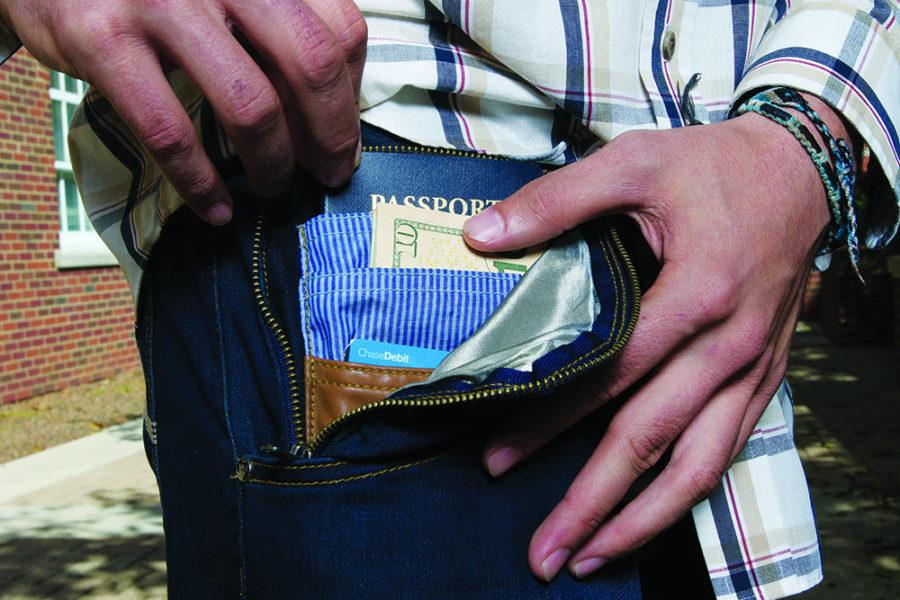Pants with Practicality
October 19, 2015
By Lexington Souers
One designs jeans for the wheelchair bound, the other designs jeans for the modern traveler. Together they’re self-coined “jeanpaneurs.”
The two represent a new aspect of the fashion industry that is combining both function and fashion.
Heidi McKenzie was in a car accident in 2007 that left her a T4 Paraplegic, meaning that she has no feeling below her chest. McKenzie eventually regained her independence, and was able to return to college. She graduated from Morehead State.
In 2012, McKenzie was named Ms. Wheelchair Kentucky. She went on to travel the U.S. telling her story and advocating for those in wheelchairs and competed in Ms. Wheelchair America.
“I realized while I was there that everyone struggled to find fashionable, functional clothing,” McKenzie said.
She studied fashion merchandising before her accident, and was able to combine those skills with her passion to create Alter Ur Ego, a company that creates functional jeans for people in wheelchairs.
“All the features are so that we can actually live our day-to-day lives and feel good and look good, rather than wearing your grandma’s clothes,” McKenzie said.
Alter Ur Ego jeans have elastic waistbands that are tapered to rise higher in the back. There are easily accessible pockets on the thighs, and loops that allow wearers to easily dress themselves.
Phillip Gordon, designer and founder of Nomad Apparel, came up with the idea for theft proof jeans after he studied abroad as a UK student. Gordon had been a victim of radio-frequency-identification theft, where thieves use a PayPass-like machine to steal credit information electronically.
“Being protected was my big thing, being protected and then being fashionable too,” Gordon said.
The two connected through the Lexington Fashion Collaborative. Gordon said McKenzie has been helpful in teaching him how to run a successful Kickstarter campaign and a business.
They have been able to bond over similar challenges, like marketing and achieving a patent. They also face their market with a lot of adversity.
“It’s a three billion dollar a year industry and nobody has any faith in you if you’re coming up,” Gordon said.
One of the biggest challenges is finding investors and partners who cares as much as the creators do about their product. McKenzie said she is looking for an investor who will compliment her personality, rather than just back her product.
An evolving market has made business easier for Gordon and McKenzie.
“In today’s society it’s a lot easier to get connected like I did and actually bring your product to life,” Gordon said.
The pair offered advice to those interested becoming and entrepreneur. McKenzie said while criticism is inevitable, she used it to push herself. Gordon agreed with McKenzie, saying passion is essential to achieving your goal.
“They’ll say you don’t have the capital, you don’t have the resources,” Gordon said. “Truly everyone has the resources if you have the will to do it.”
However both Gordon and McKenzie warned that turning an idea into a reality is a strikingly independent venture.
“It’s kind of lonely, that entrepreneur life,” Gordon said. “Like I went to entrepreneur club and there was nobody.”
What pushes Gordon and McKenzie is the story behind their products. For McKenzie, Alter Ur Ego jeans are more than just a way to make those who are wheelchair bound more fashionable.
“One of my huge things is, hopefully these will break down social barriers,” McKenzie said. “Some people feel awkward around people in wheelchairs, so saying, ‘Hey, that’s a cute pair of jeans,’ at least it opens up the conversation to go anywhere from there.”
Both Gordon and McKenzie are focused on creating products that combine fashion and function.
“I think what we’re doing is revolutionizing how you perceive fashion. Fashion is meant to be functional,” Gordon said. “We want to redefine the industry.”
































































































































































